The AMD Ryzen 5 1600X vs Core i5 Review: Twelve Threads vs Four at $250
by Ian Cutress on April 11, 2017 9:00 AM ESTBenchmarking Performance: CPU Encoding Tests
One of the interesting elements on modern processors is encoding performance. This includes encryption/decryption, as well as video transcoding from one video format to another. In the encrypt/decrypt scenario, this remains pertinent to on-the-fly encryption of sensitive data - a process by which more modern devices are leaning to for software security. Video transcoding as a tool to adjust the quality, file size and resolution of a video file has boomed in recent years, such as providing the optimum video for devices before consumption, or for game streamers who are wanting to upload the output from their video camera in real-time. As we move into live 3D video, this task will only get more strenuous, and it turns out that the performance of certain algorithms is a function of the input/output of the content.
7-Zip
One of the freeware compression tools that offers good scaling performance between processors is 7-Zip. It runs under an open-source licence, is fast, and easy to use tool for power users. We run the benchmark mode via the command line for four loops and take the output score.
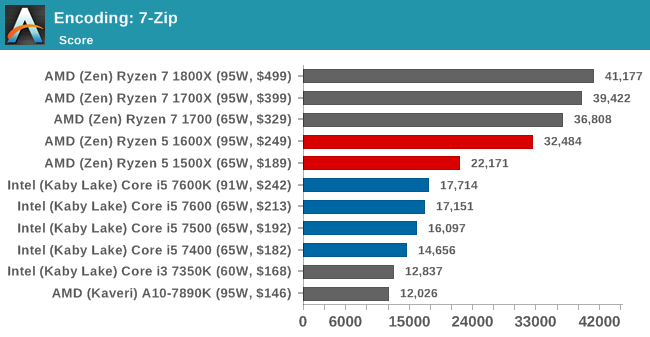
WinRAR 5.40
For the 2017 test suite, we move to the latest version of WinRAR in our compression test. WinRAR in some quarters is more user friendly that 7-Zip, hence its inclusion. Rather than use a benchmark mode as we did with 7-Zip, here we take a set of files representative of a generic stack (33 video files in 1.37 GB, 2834 smaller website files in 370 folders in 150 MB) of compressible and incompressible formats. The results shown are the time taken to encode the file. Due to DRAM caching, we run the test 10 times and take the average of the last five runs when the benchmark is in a steady state.
AES Encoding
Algorithms using AES coding have spread far and wide as a ubiquitous tool for encryption. Again, this is another CPU limited test, and modern CPUs have special AES pathways to accelerate their performance. We often see scaling in both frequency and cores with this benchmark. We use the latest version of TrueCrypt and run its benchmark mode over 1GB of in-DRAM data. Results shown are the GB/s average of encryption and decryption.
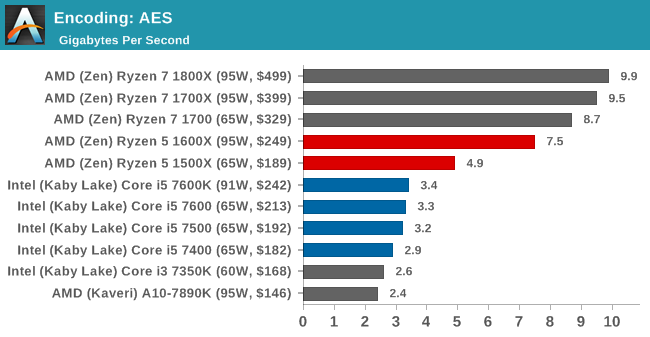
HandBrake H264 and HEVC
As mentioned above, video transcoding (both encode and decode) is a hot topic in performance metrics as more and more content is being created. First consideration is the standard in which the video is encoded, which can be lossless or lossy, trade performance for file-size, trade quality for file-size, or all of the above can increase encoding rates to help accelerate decoding rates. Alongside Google's favorite codec, VP9, there are two others that are taking hold: H264, the older codec, is practically everywhere and is designed to be optimized for 1080p video, and HEVC (or H265) that is aimed to provide the same quality as H264 but at a lower file-size (or better quality for the same size). HEVC is important as 4K is streamed over the air, meaning less bits need to be transferred for the same quality content.
Handbrake is a favored tool for transcoding, and so our test regime takes care of three areas.
Low Quality/Resolution H264: He we transcode a 640x266 H264 rip of a 2 hour film, and change the encoding from Main profile to High profile, using the very-fast preset.
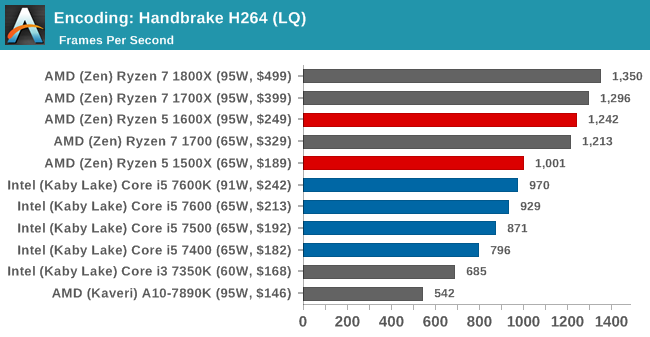
High Quality/Resolution H264: A similar test, but this time we take a ten-minute double 4K (3840x4320) file running at 60 Hz and transcode from Main to High, using the very-fast preset.
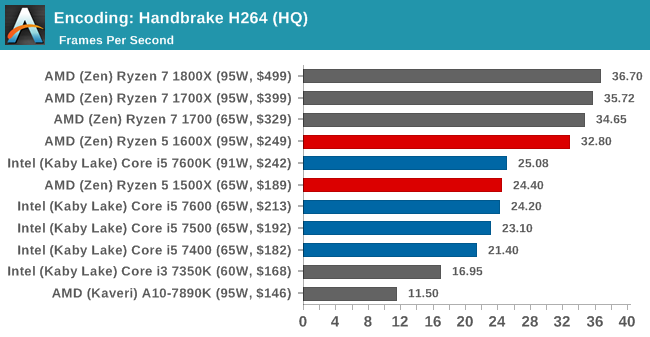
HEVC Test: Using the same video in HQ, we change the resolution and codec of the original video from 4K60 in H264 into 4Kp30 HEVC. This causes a dramatic reduction in filesize (this is a different test to the Ryzen 7 review).
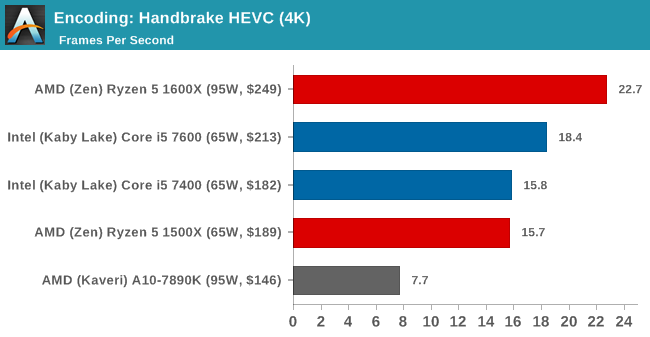


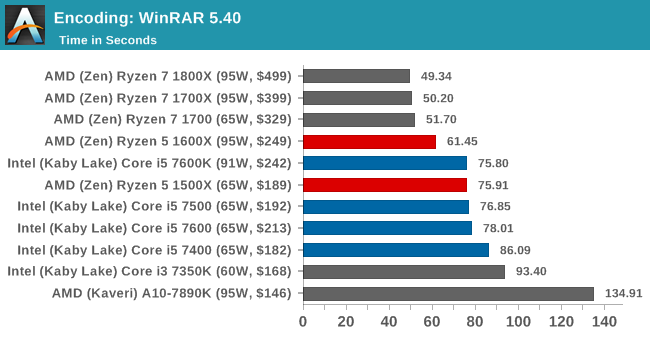








254 Comments
View All Comments
happy medium - Tuesday, April 11, 2017 - link
this review could not have purposely made the Ryzen cpu's look any better.This site is ruined.
Drumsticks - Tuesday, April 11, 2017 - link
Care to elaborate?mmegibb - Tuesday, April 11, 2017 - link
This review is consistent with what I saw with the Ryzen 7 reviews on multiple sites. In multi-threaded tests, Ryzen beats Intel because, well, it has more threads. Single thread performance lags Intel. It's up to the user to figure out price/performance for their particular needs.I'm with Drumsticks, please elaborate. This kind of drive-by comment does nothing to advance the conversation.
Anandtech's suite of benchmarks is one of the best.
fanofanand - Tuesday, April 11, 2017 - link
Not only is Anandtech's benchmark suite the best, Ian is the best CPU reviewer in the business, and quite probably in the world. I would love to know what reviewer out there has a better understanding of uArches and has the experience of a professional overclocker who pushed every component to the limits. Ian's experience and background is ideal to review CPUs, and after having read the entire thing I didn't detect even a whiff of bias. Claims of bias towards AMD at Anandtech, that's a new one to me!ddriver - Tuesday, April 11, 2017 - link
Well, the JS benchmarks are pointless really.There is much to be demanded from the benches.
Too much emphasis put on games, do really 50% of the people use computers primarily for games?
Too little on practical tests, number crunching tests are with software barely anyone uses.
People need to see performance in premiere, after effects, cubase, pro tools, vray and similar.
Bias towards AMD however is hilarious, it is quite the opposite actually.
th3ron - Tuesday, April 11, 2017 - link
You seem to forget this is a review of $250 budget cpu's. No one's going to be running pro apps like the ones you listed on cpu's like these. The number crunching test are there for comparison with the more expensive cpu's. I don't think anyones ever bought a cpu based on its Winrar score.A lot of people will uses these cpu's for gaming so lots of gaming benchmarks make sense.
ddriver - Tuesday, April 11, 2017 - link
People who use winrar most likely do not make logical considerations, because if they did, they wouldn't be using garbage like winrar.It is not a budget product, it is mid-range. And it is perfectly capable of doing a good job in content creation and such at a great value. Most of the software used in this review can barely make use of 4 threads, making such tests 66.66% pointless. Most of the tests that can actually scale to utilize the chip are software barely anyone uses or isn't even practically useful to begin with. And contrary to your beliefs, that doesn't accurately translate into performance in software that people actually use.
wolfemane - Wednesday, April 12, 2017 - link
Get off your high horse. People with midrange CPUs aren't going to use pro software? Are you really serious? I know far more people on i5s and Older AMD CPU's who use premier and after effects. My wife and I use the Adobe suite regularly. Both our systems are running 2500k's. She is photographer and has been using mid-range components for just as long. I've been using premier, after effects, and Adobe media encoder longer than she's been using Photoshop. Adobe makes it pretty cheap to use their software. When they went to a monthly rate for their entire suite with free cloud based storage for $25 a month (I think it's a bit more expensive now) we jumped on it. The cloud storage alone is worth twice that.There's no way in hell I'd drop $500+ just on a processor and Intel has made it impossible for mid to low budget builders to afford 6+ cores. But with a pretty quick 6c/12t CPU, I'll be going with AMD for our next range of CPUs, which is coming soon. Sandy bridge is getting old. Just waiting for AM4 mITX.
calken99 - Wednesday, April 12, 2017 - link
Are you really telling me that the 70,000 i5 computers in the business that I work don't use any pro applications? That's just one small corporation. Businesses will dwarf the annual sales of CPUs in comparison to the domestic market.Meteor2 - Sunday, April 16, 2017 - link
I was trying to get some numbers on this. I think consumer computers outnumber corporate by a good two to one. Not sure the average age is that different either -- most places I've seen have been holding on to their PCs for years. Core 2s abound!